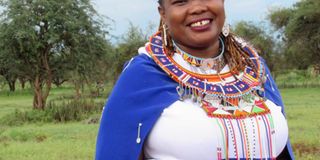Married at nine, rescued at 13

What you need to know:
- Esther* was nine years old when she her father married her off to a 28-year-old Moran.
- She would also get a beating for not meeting her wifely obligations like milking cows, fetching water and firewood, and taking care of her husband's grandmother.
- Her zeal for education that finally saved her.
- Asnet* at the age of 12, escaped from a forced marriage to a 50-year-old man.
- She ran away at dawn, walking kilometres to Loitoktok where she reported to the police.
- The two girls are among the 24 currently at Hope Transitional Centre in Loitoktok.
Esther* was nine years old when she her father married her off to a 28-year-old Moran.
In 2016, her suitor having received her polygamous father’s blessings, picked her from their homestead in Olgululi village in Kajiado County.
She was oblivious of her destination until she found herself alone with the Moran in a manyatta in Entonet village.
She had become a wife and no amount of crying would persuade the man otherwise. He would beat her whenever she cried out of pain whenever he had sexual relations with her.
She would also get a beating for failing to meet her wifely obligations like milking cows, fetching water and firewood, in addition to taking care of his grandmother.
“It was too much work but he would not allow me to rest. Instead, he beat me up for failing to be a responsible wife,” says Esther through a translator.
She is one of the 35 children from her father’s five wives. Her mother was the third wife and none of the children including her, went to school.
She, however, had a desire to get an education. This pushed her to forget about the chores in her matrimonial home and follow other girls attending a primary school nearby. She would hide in the bushes and watch them go about their learning.
This would, however, earn her a thorough beating from her husband.
“He would beat me today, but I would still follow the girls the next day. I really wanted to go to school,” she says.
Her zeal for education that finally saved her.
RESCUED
Early March this year, a teacher who had recently been posted to the school, saw her hiding in the bushes and invited her to one of her classes. She later opened up to the teacher who then notified the local administration, police and an anti-child marriage campaigner in Kajiado County.
They rescued her at 2am before schools closed on March 13. She is currently sheltered at Hope Transitional Centre, a safe house in Loitoktok, Kajiado County.
The husband and the father were arrested and are out on bond awaiting prosecution at the Loitoktok law courts upon resumption of normal court operations.
Unlike Esther, Asnet* at the age of 12, was lucky to escape a forced marriage to a 50-year-old man in 2017.
She lived with her grandmother in Murutot village in Kajiado South sub-county about 15 minutes away from her father’s homestead.
Sometime in March that year, Asnet who was then in Class Six at a school in Murutot village, got information of her father’s summon from her grandmother.
“It was on Friday and I had just returned from school,” she says.
“I was worried since the school had not closed, so I ran to see my father only for him to say he had found a suitor for me who would pick me up the following day,” she says, “but I told him to his face that I was too young to be married and he wasn’t amused. He threatened to curse me for disobeying him.”
Asnet finally ran away at dawn, walking kilometres to Loitoktok where she reported the incident to the police. They took her to Hope Transitional Centre, where she currently stays.
CULTURAL PRACTICE
Her father was arrested and imprisoned for six months.
Asnet is now in Class Five at Lenkai Christian School, while Esther will join special kindergarten at the same school as soon as schools re-open.
Hope Transitional Centre and Lenkai Christian School are facilities established by Hope Beyond Foundation. Ms Dorcas Parit is the founder and Executive Director of the Loitoktok based foundation.
The two girls are among the 24 currently at rescue centre, which has housed more than 500 girls since its establishment in 2013.
Despite existing laws, forced child marriage remain a major obstacle to girls’ access to education in the county, says Ms Parit.
According to her, ending the cultural practice will take more than enforcement of existing of laws.
“Here, it is all about the culture not the laws,” she says.
“There must be continuous sensitisation for the mothers, fathers and elders, to know the value of girl-child education. We must address the root causes to save girls from child marriages,” she notes.
As the world marks the International Day of the African Childtoday under thetheme Access to a Child-Friendly Justice System in Africa, Ms Parit says this will only happen with proper sensitisation of all stakeholders.
Ms Violet Muthiga, Executive Director of Sauti Ya Wanawake, says child-friendly justice system is about timely conclusion of children’s cases.
“This would reduce apathy developed by children survivors and their families in accessing justice,” she says.
She adds that: “Delayed justice deters reporting of cases as communities and community child rights’ defenders feel “ defeated” when court process take long to finalise on cases.”
Ms Grace Uwizeye , an expert on ending harmful practices at Equality Now, notes that strengthening helpline and online referral services would assist in safeguarding girls’ rights.
“The government must ensure victims of child marriage and gender-based violence (GBV) have access to justice. The law enforcement agencies and judicial system must prioritise and expedite child marriage and GBV cases,” she says.





